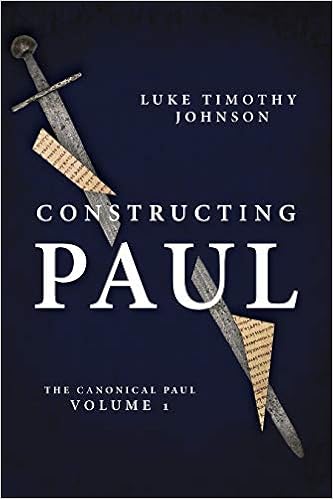
I still remember the first edition of Luke Timothy Johnson's The Writings of the New Testament forty years ago. It is still in print in its 2010 third revision. From there his commentaries on Luke-Acts, Hebrews, James, and a wide range of other publications on New Testament background, theology, religious experience, and hermeneutics have continued to flow. But now we have a two volume magnum opus on the Apostle Paul, the first volume published in May 2020.
Constructing Paul vol 1 by Luke Timothy Johnson is readable scholarship, authoritative and persuasive, independent in its conclusions, and is a constructive account of Paul's life, social context, cultural environment, and relations with the churches with which he corresponded. Johnson does two things that make this book an important contribution. First, he uses all the canonical letters attributed to Paul in the New Testament. His defence of this approach is based on his deconstruction of the critical consensus that there are only seven "undisputed letters". Johnson insists that using the thirteen letters provides a much more rounded picture of what he calls the canonical Paul. I have always been hesitant about the confidence with which Pauline authorship of certain letters has been dismissed; I found Johnson's reasoned rebuttal persuasive in itself, and more so when the results are then set out in a way that allows for the complexities and ambiguities of Paul's personality and compound identities as Jew, Greco Roman, apostle and controversialist.
In addition to using the entire canonical corpus of Paul's letters, Johnson gives decisive weight and substance to the New Testament accounts of Paul's personal experience of Christ. Johnson is known for considering religious experience an essential body of evidence in constructing a credible account of Paul's life, the lives of the earliest Christian communities, and indeed for understanding the faith and practices of contemporary Christians. Paul's encounter with Christ, his experience of life in the Spirit, and the reconfiguration of his worldview, created for Paul a radically new understanding of God's purpose for Israel, the Gentiles and the new mission of the communities formed by faith in Christ. But that radical newness was not seen by him as a final discontinuity, but a fulfilling of God's purposes through Messiah Jesus. While Johnson has long insisted that the religious experience of believers is relevant data in trying to understand the historical, social, cultural and ecclesial context of those early Christian communities, it is in this book that he pursues that line of investigation in constructing Paul. The result is a tour de force, readable, persuasive, and for me, convincing in its portrait of Paul.